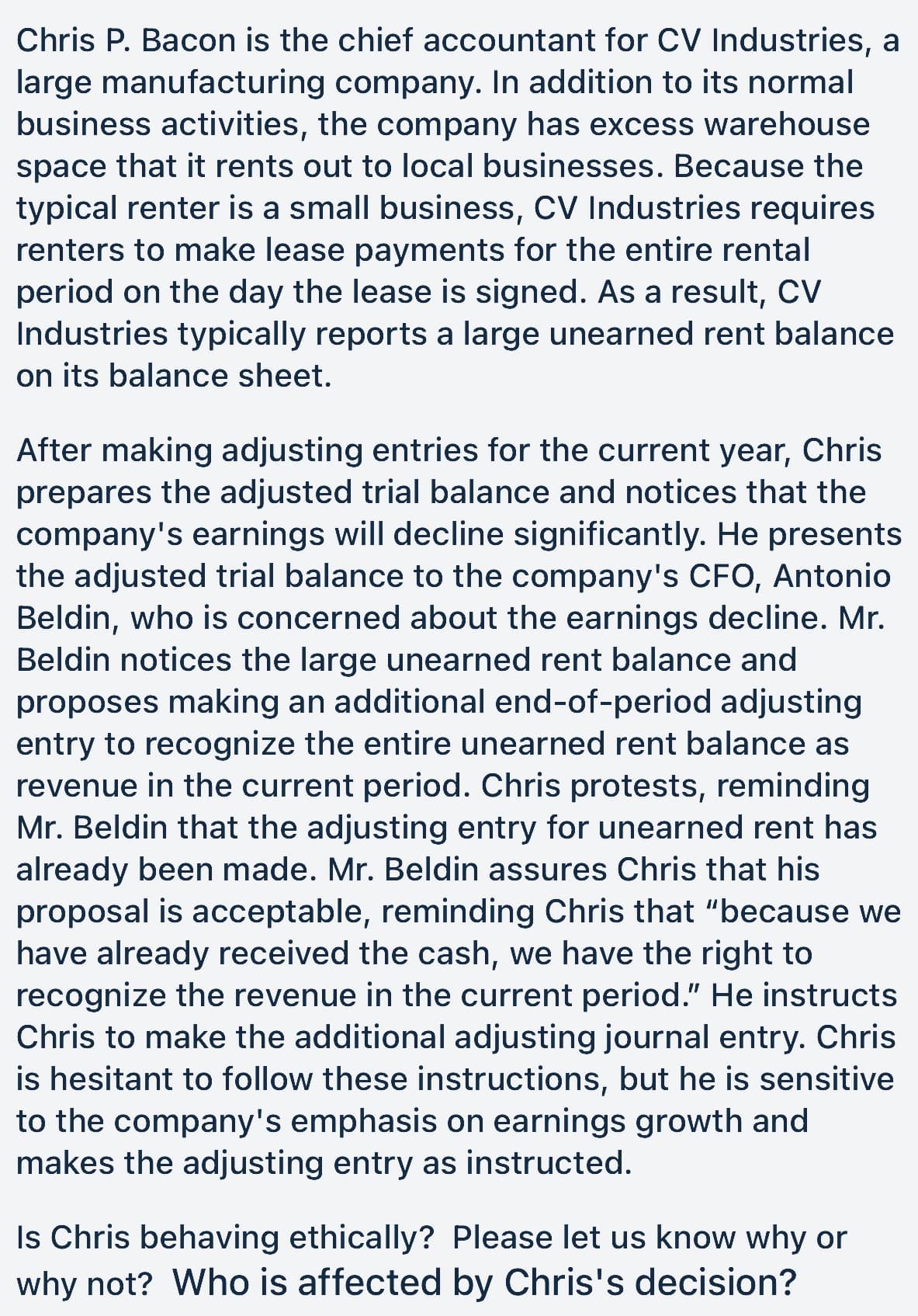Chris P. Bacon is the chief accountant for CV Industries, a large manufacturing company. In addition to its normal business activities, the company has excess warehouse space that it rents out to local businesses. Because the typical renter is a small business, CV Industries requires renters to make lease payments for the entire rental period on the day the lease is signed. As a result, CV Industries typically reports a large unearned rent balance on its balance sheet. After making adjusting entries for the current year, Chris prepares the adjusted trial balance and notices that the company's earnings will decline significantly. He presents the adjusted trial balance to the company's CFO, Antonio Beldin, who is concerned about the earnings decline. Mr. Beldin notices the large unearned rent balance and proposes making an additional end-of-period adjusting entry to recognize the entire unearned rent balance as revenue in the current period. Chris protests, reminding Mr. Beldin that the adjusting entry for unearned rent has already been made. Mr. Beldin assures Chris that his proposal is acceptable, reminding Chris that "because we have already received the cash, we have the right to recognize the revenue in the current period." He instructs Chris to make the additional adjusting journal entry. Chris is hesitant to follow these instructions, but he is sensitive to the company's emphasis on earnings growth and makes the adjusting entry as instructed. Is Chris behaving ethically? Please let us know why or why not? Who is affected by Chris's decision?
Chris P. Bacon is the chief accountant for CV Industries, a large manufacturing company. In addition to its normal business activities, the company has excess warehouse space that it rents out to local businesses. Because the typical renter is a small business, CV Industries requires renters to make lease payments for the entire rental period on the day the lease is signed. As a result, CV Industries typically reports a large unearned rent balance on its balance sheet. After making adjusting entries for the current year, Chris prepares the adjusted trial balance and notices that the company's earnings will decline significantly. He presents the adjusted trial balance to the company's CFO, Antonio Beldin, who is concerned about the earnings decline. Mr. Beldin notices the large unearned rent balance and proposes making an additional end-of-period adjusting entry to recognize the entire unearned rent balance as revenue in the current period. Chris protests, reminding Mr. Beldin that the adjusting entry for unearned rent has already been made. Mr. Beldin assures Chris that his proposal is acceptable, reminding Chris that "because we have already received the cash, we have the right to recognize the revenue in the current period." He instructs Chris to make the additional adjusting journal entry. Chris is hesitant to follow these instructions, but he is sensitive to the company's emphasis on earnings growth and makes the adjusting entry as instructed. Is Chris behaving ethically? Please let us know why or why not? Who is affected by Chris's decision?
Chapter1: Financial Statements And Business Decisions
Section: Chapter Questions
Problem 1Q
Related questions
Question

Transcribed Image Text:Chris P. Bacon is the chief accountant for CV Industries, a
large manufacturing company. In addition to its normal
business activities, the company has excess warehouse
space that it rents out to local businesses. Because the
typical renter is a small business, CV Industries requires
renters to make lease payments for the entire rental
period on the day the lease is signed. As a result, CV
Industries typically reports a large unearned rent balance
on its balance sheet.
After making adjusting entries for the current year, Chris
prepares the adjusted trial balance and notices that the
company's earnings will decline significantly. He presents
the adjusted trial balance to the company's CFO, Antonio
Beldin, who is concerned about the earnings decline. Mr.
Beldin notices the large unearned rent balance and
proposes making an additional end-of-period adjusting
entry to recognize the entire unearned rent balance as
revenue in the current period. Chris protests, reminding
Mr. Beldin that the adjusting entry for unearned rent has
already been made. Mr. Beldin assures Chris that his
proposal is acceptable, reminding Chris that "because we
have already received the cash, we have the right to
recognize the revenue in the current period." He instructs
Chris to make the additional adjusting journal entry. Chris
is hesitant to follow these instructions, but he is sensitive
to the company's emphasis on earnings growth and
makes the adjusting entry as instructed.
Is Chris behaving ethically? Please let us know why or
why not? Who is affected by Chris's decision?
Expert Solution
This question has been solved!
Explore an expertly crafted, step-by-step solution for a thorough understanding of key concepts.
This is a popular solution!
Trending now
This is a popular solution!
Step by step
Solved in 2 steps

Knowledge Booster
Learn more about
Need a deep-dive on the concept behind this application? Look no further. Learn more about this topic, accounting and related others by exploring similar questions and additional content below.Recommended textbooks for you


Accounting
Accounting
ISBN:
9781337272094
Author:
WARREN, Carl S., Reeve, James M., Duchac, Jonathan E.
Publisher:
Cengage Learning,

Accounting Information Systems
Accounting
ISBN:
9781337619202
Author:
Hall, James A.
Publisher:
Cengage Learning,


Accounting
Accounting
ISBN:
9781337272094
Author:
WARREN, Carl S., Reeve, James M., Duchac, Jonathan E.
Publisher:
Cengage Learning,

Accounting Information Systems
Accounting
ISBN:
9781337619202
Author:
Hall, James A.
Publisher:
Cengage Learning,

Horngren's Cost Accounting: A Managerial Emphasis…
Accounting
ISBN:
9780134475585
Author:
Srikant M. Datar, Madhav V. Rajan
Publisher:
PEARSON

Intermediate Accounting
Accounting
ISBN:
9781259722660
Author:
J. David Spiceland, Mark W. Nelson, Wayne M Thomas
Publisher:
McGraw-Hill Education

Financial and Managerial Accounting
Accounting
ISBN:
9781259726705
Author:
John J Wild, Ken W. Shaw, Barbara Chiappetta Fundamental Accounting Principles
Publisher:
McGraw-Hill Education